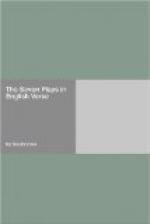COR. SH. Good tidings for thy house and husband, queen.
JO. What are they? Who hath sent thee to our hall?
COR. SH. From Corinth come I, and will quickly
tell
What sure will please you; though perchance ’twill
grieve.
JO. What news can move us thus two ways at once?
COR. SH. ’Twas rumoured that the people
of the land
Of Corinth would make Oedipus their king.
JO. Is ancient Polybus not still in power?
COR. SH. No. Death confines him in a kingly grave.
JO. Hold there! How say you? Polybus in his grave?
COR. SH. May I die for him if I speak not true!
JO. (To an attendant).
Run thou, and tell this quickly to my lord!
Voices of prophecy, where are ye now?
Long time hath Oedipus, a homeless man,
Trembled with fear of slaying Polybus.
Who now lies slain by Fortune, not by him.
Enter OEDIPUS.
OED. Jocasta, my dear queen, why didst thou send
To bring me hither from our palace-hall?
JO. Hear that man’s tale, and then consider
well
The end of yonder dreadful prophecy.
OED. Who is the man, and what his errand here?
JO. He comes from Corinth, to make known to thee
That Polybus, thy father, is no more.
OED. How, stranger? Let me learn it from thy mouth.
COR. SH. If my first duty be to make this
clear,
Know beyond doubt that he is dead and gone.
OED. By illness coming o’er him, or by guile?
COR. SH. Light pressure lays to rest the timeworn frame.
OED. He was subdued by sickness then, poor soul!
COR. SH. By sickness and the burden of his years.
OED. Ah! my Jocasta, who again will heed
The Pythian hearth oracular, and birds
Screaming in air, blind guides! that would have made
My father’s death my deed; but he is gone,
Hidden underneath the ground, while I stand hero
Harmless and weaponless:—unless, perchance,
My absence killed him,—so he may have died
Through me. But be that as it may, the grave
That covers Polybus, hath silenced, too,
One voice of prophecy, worth nothing now.
JO. Did I not tell thee so, long since?
OED. Thou didst.
But I was drawn to error by my fear.
JO. Now cast it altogether out of mind.
OED. Must I not fear my mother’s marriage-bed?
JO. Why should man fear, seeing his course is
ruled
By fortune, and he nothing can foreknow?
’Tis best to live at ease as best one may.
Then fear not thou thy mother’s nuptial hour.
Many a man ere now in dreams hath lain
With her who bare him. He hath least annoy
Who with such omens troubleth not his mind.
OED. That word would be well spoken, were not she
Alive that gave me birth. But since she lives,
Though you speak well, yet have I cause for fear.




